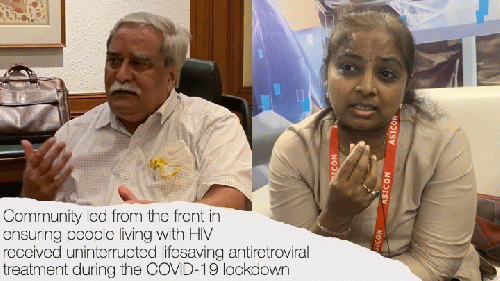During the lockdown, community led from the front in ensuring HIV treatment reaches people
SHOBHA SHUKLA - CNS

When lockdown was clamped in India, it was the people-networks that ensured lifesaving HIV medicines reach those in need
(Image by CNS) Details DMCA
"HIV treatment and care could continue during COVID-19, thanks to intense community participation," said Daxa Patel, in an interview given to CNS. Daxa is Secretary General at Gujarat State Network of People living with HIV (GSNP+) and is former President of National Coalition of People Living with HIV (NCPI+) in India.
Former Head of Epidemiology at the Indian Council of Medical Research and a noted HIV expert, Dr Raman R Gangakhedkar, also echoed similar sentiments that during the COVID-19 lockdown, it was the people living with HIV who ensured that medicines reached them.
In an exclusive interview with CNS (Citizen News Service) Padamshree Dr Raman R Gangakhedkar shared: "The initial fear when the lockdown was announced (in March 2020) was that a large number of the nearly 1.6 million (16 lakh) people living with HIV who were receiving the lifesaving antiretroviral treatment, will not be able to adhere to treatment. Fortunately, at that time the community of people living with HIV took the lead to provide drugs to all those who might have otherwise stayed at home without treatment - either out of fear of acquiring COVID-19 infection if they went to antiretroviral therapy centres, or due to travel restrictions. The Government of India's National AIDS Control Organisation (NACO) also supported the community's policy by allowing multi-month dispensing of antiretroviral therapy."
Community response to the challenges posed by COVID-19
Recalling the horror of those days (that continued for long) unleashed by the pandemic, Daxa said: "The lockdown was announced suddenly without any prior notice. Daily life was hampered for all, including the community of people living with HIV, creating many problems for them to access HIV care services - especially the daily wage earners, migrants from other states, and those who had not disclosed their HIV positive status to their families. But the community network members stood up to take on and overcome these challenges. Sensing that there might be a lockdown, we got in touch with NACO, State AIDS Control Societies, and local district authorities even before the lockdown was clamped. We collaborated and partnered with them to develop the multi-month dispensing protocol of antiretroviral therapy as well as drug dispensing refilling through the community members at the community centres and/or near the home of persons living with HIV. More than 50,000 community members in our region, connected with antiretroviral therapy medicines dispensing at the nearest place to their house or even at their doorstep. Even those taking medicines from the private sector faced similar challenges and we linked them with the government centres for accessing antiretroviral therapy without interruption. All this was achieved through the joint efforts by community members."
Both, Daxa and Dr Gangakhedkar, concede that while treatment disruption was minimal due to immediate community response in coordination with NACO and State AIDS Control Societies, other HIV-related services were affected. Testing for HIV went down dramatically because neither the people approached testing centres, nor the services could be provided as the entire health system's priority was COVID-19 management. Targeted intervention programmes were also hampered as outreach could not be done. But thanks to community support and uninterrupted supplies ensured by NACO, there was high antiretroviral therapy coverage during the pandemic.
(Note: You can view every article as one long page if you sign up as an Advocate Member, or higher).





